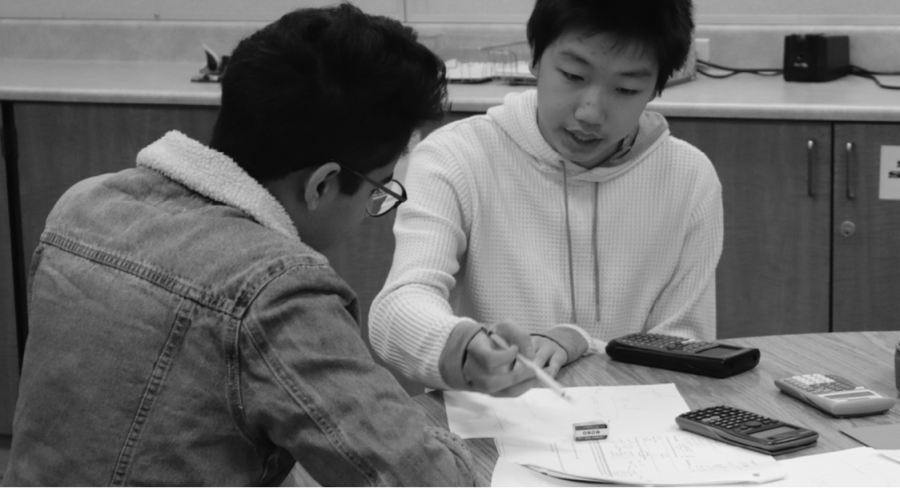As the end-of-the-day school bell rings, a growing murmur and shuffling of notebooks accompanies the packing-up routine for most Paly students waiting to return home after a tiring school day. But for sophomore Ethan Hwang, that school bell signifies the start of another period of teaching and learning — tired or not.
Hwang is one of many tutors and tutees in Paly’s Peer Tutoring Center (PTC). Nestled in the corner of the 400 building, the PTC sits as a welcoming place for all students to receive tutoring help, collaborate with other students, study quietly and borrow books.
“It’s really great that I can help someone out in a class where they’re struggling, and I can also receive help for a class I’m struggling in at the same time.”
Sophomore Ethan Hwang
Story continues below advertisement
Open every day during lunch, tutorial or after school, the classroom is modestly decorated, adorned with a couple of tables and chairs and enveloped by whiteboards. Yet, its unassuming ambiance belies the utility and friendship that it fosters on a weekly basis for countless Paly students.
According to Maria Lim, the PTC Coordinator, the PTC started 15 to 20 years ago as the Academic Resource Center (ARC), serving as a testing center and a place for peer tutoring. About five to seven years ago, the new Testing Center was created, and the ARC was only used for peer tutoring.
“Last year, I decided to rename the ARC to the Peer Tutoring Center to more accurately represent what occurs here,” Lim said. “Not only does the tutoring help students who may be struggling, but it also provides good experience for the tutors. Tutors learn how to explain ideas in a way that others can understand and tutoring helps reinforce concepts for the tutor.”
However, as Paly courses remain rigorous and challenge students, the number of tutoring sessions has significantly increased since last year, with over 135 sessions scheduled each week. For sophomore Will Ballentine, the PTC has been an effective method to complement his studying.
“Tutoring has been a really big help for me since I started struggling in science,” Ballentine said. “I (receive tutoring) every tutorial, and I get help with the previous day’s lesson. My test scores have improved dramatically. It also showed me that there are many people available at the tutoring center to give me help when I need it.”
But for a number of students, the PTC is more than a place to learn new concepts and material so they can improve their test scores.
Initially looking to earn extra credit for his math class, Hwang found his time tutoring other students and receiving tutoring in the PTC to be a new avenue to get involved with the Paly community.
“We’ve all been there — struggling for a class or trying to cram for a final,” Hwang said. “I think (the PTC) fosters a really great sense of community that we help each other out when school gets tough, and no one feels like they have to do it alone. We all have our own unique strengths and weaknesses.”
For example, Hwang tutors a student who recently moved to Palo Alto in the middle of the school year from Dubai.
“Having to deal with the switch in curriculum is really tough. It makes me really happy to see that I’m able to (make) a difference in someone else’s experience at Paly and make their transition easier — given the other challenges that they face moving from a different country.”
Sophomore Ethan Hwang
Junior Ashley Guo agrees with Hwang and said tutoring in the PTC serves more than an academic purpose.
“I tutor because it’s a great way for myself to learn subjects while also helping out others who may need help in class and with homework. I feel like the PTC creates a space where students can genuinely sit down and help each other out with no judgment or competition.”
Junior Ashley Guo
According to Veronique Rasky, one of the PTC coordinators, as the PTC has grown in popularity and importance for Paly students, the coordinators have made an extra effort to maintain the quality of the program and its role as a welcoming space for students.
“I really feel it’s a special place because, at least personally, I try to make everybody feel welcome here,” Rasky said. “I really feel (the PTC is) an alternative place for students to meet, especially after hours, after all day long. We really strive to make it friendly for students. We are hoping that it is a place where (students) can feel connected. That is really my philosophy.”
Although the core purpose of the PTC is to provide a place where students can receive free help from other students who have already proven mastery in a subject, Rasky said the PTC plays an important role in reminding us why we are here in the first place.
Rasky said, “I’ve had continuous positive feedback from some students. I hope they learn that people can help each other, that we’re all in this together and it’s not all about competition. Values like these and the support … (mean) students definitely have an opportunity here to get a different angle on life than what they get elsewhere.”

